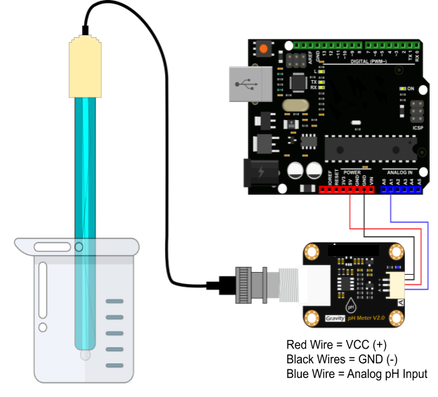This is Industrial Grade Analog PH Sensor Kit. Need to measure water quality and other parameters but haven’t got any low-cost pH meter? Find it difficult to use with Arduino?
Here, we have an Industrial Grade Analog PH Sensor Kit. This probe can be used with this pH sensor module.
The Analog pH Sensor Kit is specially designed for Arduino controllers and has a built-in simple, convenient, and practical connection and features. It has an LED that works as the Power Indicator, a BNC connector, and a PH2.0 sensor interface. To use it, just connect the pH sensor with the BND connector, and plug the PH2.0 interface into the analog input port of any Arduino controller. If pre-programmed, you will get the pH value easily. Comes in a compact plastic box with foams for better mobile storage
Circuit Diagram:
- Water quality testing
- Aquaculture
Note: This is a laboratory probe, it can’t be immersed in the liquid for a too long time.
To Explore More pH Sensors, Click here
Source Code:
#define SensorPin A0 // the pH meter Analog output is connected with the Arduino’s Analog unsigned long int avgValue; //Store the average value of the sensor feedback float b; int buf[10],temp; void setup() { pinMode(13,OUTPUT); Serial.begin(9600); Serial.println("Ready"); //Test the serial monitor } void loop() { for(int i=0;i<10;i++) //Get 10 sample value from the sensor for smooth the value { buf[i]=analogRead(SensorPin); delay(10); } for(int i=0;i<9;i++) //sort the analog from small to large { for(int j=i+1;j<10;j++) { if(buf[i]>buf[j]) { temp=buf[i]; buf[i]=buf[j]; buf[j]=temp; } } } avgValue=0; for(int i=2;i<8;i++) //take the average value of 6 center sample avgValue+=buf[i]; float phValue=(float)avgValue*5.0/1024/6; //convert the analog into millivolt phValue=3.5*phValue; //convert the millivolt into pH value Serial.print(" pH:"); Serial.print(phValue,2); Serial.println(" "); digitalWrite(13, HIGH); delay(800); digitalWrite(13, LOW);
Step to Use the pH Meter:
Cautions:
- Please use an external switching power supply, and the voltage as close as possible to the +5.00V. More accurate the voltage, the higher the accuracy!
- Before the electrode is continuously used every time, you need to calibrate it by the standard solution, in order to obtain more accurate results. The best environment temperature is about 25 ℃, and the pH value is known and reliable, close to the measured value. If you measure the acidic sample, the pH value of the standard solution should be 4.00. If you measure the alkaline sample, the pH value of the standard solution should be 9.18.Subsection calibration, just in order to get better accuracy.
- Before the pH electrode is measured in different solutions, we need to use water to wash it. We recommend using deionized water.
- Connect equipment according to the graphic, that is, the pH electrode is connected to the BNC connector on the pH meter board,and then use the connection lines, the pH meter board is connected to the analog port 0 of the Arduino controller. When the Arduino controller gets power, you will see the blue LED on board is on.
- Upload the sample code to the Arduino controller.
- Put the pH electrode into the standard solution whose pH value is 7.00,or directly shorten the input of the BNC connector. Open the serial monitor of the Arduino IDE, you can see the pH value printed on it, and the error does not exceed 0.3. Record the pH value printed, then compared with 7.00, and the difference should be changed into the “Offset” in the sample code. For example, the pH value printed is 6.88, so the difference is 0.12. You should change the “# define Offset 0.00” into “# define Offset 0.12” in your program.
- Put the pH electrode into the pH standard solution whose value is 4.00. Then wait about one minute, adjust the gain potential device, let the value stabilize at around 4.00. At this time, the acidic calibration has been completed and you can measure the pH value of an acidic solution.
Note: If you want to measure the pH value of other solutions, you must wash the pH electrode first!
Package Includes:
1 x pH probe with cable and BNC connector.
1 x pH sensor circuit board.


















Rajesh (verified owner) –
Good product.
Rajesh –